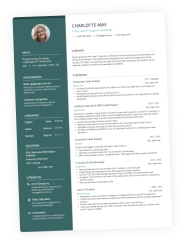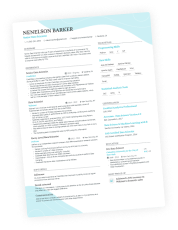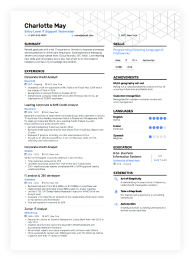These days, computer literacy is a must in almost every workplace. From developing intricate code in Python to formatting documents in Google Docs.
Even if you're working in a field that's not technology-heavy, you may be required to operate POS systems, RFID scanners, or a mobile phone.
Through the past two decades or so, computer skills have become a vital part of successful business operations. That won't be changing anytime soon.
Featuring your computer skills on your CV can help you get hired, as recruiters do care about the IT skills you've mastered.
In this Enhancv, we'll show you how to list your computer skills by:
- Defining and understanding computer skills;
- Shining a light on the top computer skills to impress employers and recruiters;
- Selecting the best (and most relevant) technologies from the many (or few) you know;
- Clearly describing computer skills: from proficiency level to certificates;
- Making the most out of your CV real estate to highlight key technologies and software.
What are computer skills?
Computer skills are those hard or technical skills that allow you to use various digital tools and IT equipment, software applications, and technologies.
For starters, computer skills are split into two types: hardware and software.
Hardware skills are your proficiency in working with all the technologies to navigate and operate computer systems. Examples include your ability to connect a computer to a network and fix various computer parts (e.g. motherboard, mouse, etc.).
Software skills are your ability to use computer programs and applications, like
- Spreadsheets and Word processors
- Database and Information management tools
- Email and Web browsers
PRO TIP
Select your CV computer skills based on both the job and industry you're applying for.
Also, make sure to precisely note your digital proficiency level for key job requirements.
Why are your computer skills wanted on your CV?
Here are five reasons why it's a good idea to feature your computer skills:
- Specific computer skills may boost your profile so that you stand out amongst candidates with similar backgrounds.
- Nearly every organisation requires at least a basic understanding of technologies.
- Aptitude in some computer skills improves your performance, efficiency, and communication.
- This hard skill set could assist you in making more informed, data-driven decisions.
- Computer skills help you to meet the demands of the ever-evolving, digitally-driven workplaces.
Examples of computer skills for your CV
Basic Computer Skills
Basic computer skills cover your day-to-day office responsibilities and are an excellent choice for candidates entering the workforce.
Featuring your basic computer skills will show your potential employers they won't need to invest much time in training you.
When listing basic computer skills on your CV, make sure to quantify how you've used them in the past. For example: "systematised data with Microsoft Excel to ensure information flow is 45% more effective".
+10 Popular basic computer skills:
- Microsoft Office Suite (Word, Excel, PowerPoint, OneNote, OneDrive)
- G Suite (Google Docs, Sheets, Drive)
- Emailing (Microsoft Outlook, Gmail)
- Typing
- Presentations (Prezi, Keynote, Google Slides, Tableau, OpenOffice Impress)
- File Management and Sharing (Microsoft SharePoint, Microsoft Access, TeamViewer, iCloud, Dropbox, Cloud-based storage)
- Internet Research (Chrome, Firefox, Safari)
- Communication (Microsoft Teams, Google Hangout, Skype, Zoom, Slack)
- Meeting Scheduling and Planning (Google Calendar)
- Video Conferencing (Lifesize)
Web tools and Data Management
Web tools are all the technologies used to create and manage website content. As well, this hard skill set includes data analysis and management.
When quantifying these specific technologies across your CV, make sure to include any relevant certifications and education you happen to have.
Web development languages and tools
- HTML
- CSS
- JavaScript
- Bootstrap
- React
- .NET
- Python
- COBOL
- Ruby on Rails
- XML
- Go
- Swift
- Kotlin
- Perl
- PHP
- iOS/Swift
- C++
- R
- Software Development
- Full-Stack Development
- Agile Development
- Debugging
Make sure to also quantify across your CV your content management systems (CMS) skills with systems like WordPress, Wix, Drupal, Joomla, Weebly, etc.
Perhaps, in your career, you happen to have hands-on experience with UX/UI design with tools like Figma, Sketch, Adobe XD, etc.; Sitemaps, Wireframes, etc.
Include within the heading any websites you’ve built in the relevant platforms to demonstrate your CMS and design skills.
Search Engine Optimization (SEO) and Search Engine Marketing (SEM) tools
- Google: Ads, Analytics, Search Console, Pagespeed Insight, Mobile-Friendly Test, Trend
- Ahrefs: Backlink Checker, SEO Toolbar
- Moz
- SEMrush
- Yoast SEO
- SERP Robot
Web tools also include digital marketing and social media management.
Detail within your experience bullets any pay-per-click advertising, email marketing campaigns (e.g. MailChimp), and social media channels (e.g. Meta, X, YouTube, LinkedIn) you’ve overseen.
Data science and analytics play an integral role in website creation, performance, and optimisation. Your CV could focus on the various tools and technologies you excel in, that are relevant to the job, for:
- Data modelling and analysis (e.g. Erwin DM, Apache Spark, SPSS, etc.)
- Database management (e.g. Oracle, Apache Hive, Amazon RDS, XML, Teradata, Apache Cassandra, etc.)
- Database integration (e.g. MongoDB, etc.)
- Database communication with SQL (e.g. MySQL, PostgreSQL, Microsoft SQL Server, NoSQL, etc.)
Also, operating and managing data could be done with the likes of more complex Excel formulas (e.g. macros, pivot tables, relational databases, VLOOKUP, etc.). Make sure to demonstrate how you’ve used these formulas to derive business crucial data.
6 data visualisation tools for your CV
- Power BI
- Tableau
- Infogram
- ChartBlocks
- Datawrapper
- Grafana
In recent years, more and more roles require employees to have technical knowledge of machine learning and AI tools.
Describe on your CV your forward-facing skill set by quantifying how you’ve used these technologies in the past and what you’ve achieved:
- TensorFlow
- scikit-learn
- Jupyter
- PyTorch
- Keras
- pandas
- NumPy
- Matplotlib
- Natural language processing
- Deep learning
- Algorithm development
- Spark
- Blockchain
Software Skills
Software literacy encompasses all the programs and applications you use. Software is used in various fields like
- Project management - Microsoft Project, Trello, Asana, JIRA, Agile methodology, Scrum, Kanban, Lean, Basecamp
- Enterprise resource planning (ERP) systems and Business management - Business continuity planning (BCP), Customer relationship management (CRM), Supply Chain Management, Airtable, Automated Billing Systems, Salesforce, Business Intelligence, SAP
- Graphic Design - Adobe Photoshop, Illustrator, InDesign, CorelDRAW, Spark, AutoCAD, Premiere Pro, After Effects, Final Cut Pro, Dreamweaver, Adobe XD, Audacity, Canva
- E-Commerce - Shopify, Magento, WooCommerce, Shopify
- HR management - Kissflow HR Cloud, Zoho People, iCIMS Talent Acquisition, Breezy HR, Zenefits
- Accounting - QuickBooks, Xero, FreshBooks, Oracle NetSuite, Zoho Books, SAP Concur, AccountEdge Pro, Wave Accounting
Hardware skills and Cybersecurity
Hardware skills are your abilities to build, repair, and maintain a computer (or other device).
Tech-heavy roles (e.g. system administrator or technical support) would require you to demonstrate experience in operating system configuration (e.g. for Windows, macOS, Linux).
Other technical skills could also include
- hardware troubleshooting and maintenance of computer drivers and components (e.g. cabling, motherboards, hard drives, external devices, power supply, cooling systems, ports, etc.);
- virtualised/ neutral networks (e.g. WAN/LAN, TCI/IP), network automation, and servers (e.g. DNS, DHCP, etc.)
- cloud management and computing (e.g. AWS, Azure, Google Cloud, Cisco)
Include any system you've set up that deals with your office's internet connection (e.g. working with wireless configurations, modems, routers, IP addresses, bandwidths, ethernet connections, etc.)
Within this section, we've also included cybersecurity skills, as they tend to integrate both your hardware and software technical know-how.
CV cybersecurity skills include:
- Antivirus programs (Norton, McAfee, Windows firewall)
- Single Sign-On (SSO)
- Active Directory
- Password resets
How to demonstrate computer skills on your CV
- Every industry has its own computer skills requirements. As a general rule of thumb, most demand working knowledge of MS Office, Google Workspaces, Adobe Creative Suite, and email.
- Prioritise relevant computer skills that match the job requirements. Use industry-specific keywords to pass the Applicant Tracking Systems (ATS) screening of your CV.
- Interweave computer skills across your CV. Make sure to quantify your specific computer skills across different sections.
- Don't just list your on-the-job responsibilities. Quantify your computer skills with a powerful action verb, followed by a specific accomplishment.
- IT training programs and certificates (e.g. CompTIA A+, Cisco CCNA, etc.) highlight your competence. Ensure to include the certificate name, the institution it has been issued from, and the year you earned it.
Example 1: Show computer skills in the experience section
Ensure your CV experience provides context as to when, how, and how you've applied your computer skills with:
- personal and professional projects;
- achievements, recognitions, and awards;
- the impact your work has had on the whole business.
The best way to showcase your computer skills? Always integrate numbers to demonstrate your potential.
Take inspiration from this senior project manager CV:
- •Implemented Jira for project tracking, resulting in a 15% reduction in project delivery time
- •Led cross-functional teams in adopting Agile practices, leading to a 30% improvement in project completion rate
- •Leveraged Google Workspace tools to streamline communication and collaboration, achieving a 95% satisfaction rate among team members and stakeholders
- •Managed project budgets using Smartsheets, consistently keeping projects within 5% of allocated budget, saving the company an average of £50,000 per project
Discover four more tips on how to help employers understand your computer skills:
- Write your experience in reverse-chronological order: starting with your most recent employers, first.
- List between three and five bullets to align your computer skills (and/or software you've used) with achievements.
- Make sure your bullets are concise, easy to read, and feature the most relevant information to the role.
- Don't spell out all the computer skills that you have, as some are pretty obvious. Instead, focus on the ones you excel in or are critical for the job.
Example 2: Demonstrate computer skills in the CV summary section
Your professional CV summary has to provide an overview of your career, while briefly mentioning your technical expertise.
The summary has to be no longer than five sentences that include:
- your current title and years of experience;
- the biggest highlights of your career;
- computer skills that are relevant and set you apart.
Example 3: Show your computer skills in your achievements sections
Quantify your hardware and software skills using precise numbers, statistics, while also integrating time frames.
Sample achievement can be:
- how you've used your technical know-how to achieve business goals or solve problems;
- workshops to show you're up to speed with the latest trends;
- relevant projects with notable results;
- tech-based accomplishments that positively impacted the organisation's bottom line.
Example 4: Use a separate skills section
The skills section is one of the first things recruiters will notice across your CV. That's why you should feature all the technologies that make you stand out.
Don't list all the computer skills you have, but select between nine and twelve, which are most relevant to the role.
Avoid dedicating CV real estate to basic computer skills (e.g. Microsoft Office or email), but instead, detail more of the niche knowledge you have.
Should I show or say what level my computer skills are?
Quantify your proficiency for required skills or ones you excel in. Include only the tools and software you're comfortable with.
Your CV computer skills should be easy to understand for recruiters. That’s why you could:
- use a scale (fundamental, basic, intermediate, advanced, etc.) to classify your aptitude level;
- list the technology alongside the number of years of experience you have;
- support your technical know-how with relevant industry-recognised certification.
Should I categorise my computer skills?
Group your CV computer skills into categories (e.g. system administration, software development, etc.). This would help your potential employers understand your technical capabilities.
For example, listing machine learning, automation, and kanban would demonstrate your adaptability and agility skill set.
Computer skills: key takeaways for your CV
- Every role has specific computer skills requirements: make sure to dedicate space on your CV to quantify how you meet them.
- Computer skills encompass hardware technologies and software applications. Ensure you’ve listed any relevant experience you have in both.
- The best way to describe your computer skills is either via practical examples of your work and achievements or using industry-recognised certifications.
- Interweave your computer skill set across different CV sections to impress recruiters, pass the ATS, and prove your technical expertise.
- Include your computer skills proficiency level so that recruiters can understand your experience.



